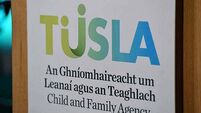Concerns over ‘prudent management’ of NTPF raised in CHI report

By Cillian Sherlock, PA
An internal Children’s Health Ireland (CHI) report raised concerns about prudent management of clinics funded through the National Treatment Purchase Fund (NTPF).
The review also found that certain NTPF-funded clinics did not adhere to the standard of seeing the longest-waiting patients first.
In addition, data suggested that some CHI patients could have been seen by other departmental colleagues within the existing day-to-day services and “potentially managed in a more pro-active way”.
The NTPF, which is a body that arranges external treatments for patients on public hospital waiting lists as well as insourcing within public hospitals themselves, has come under scrutiny in recent weeks.
It was reported that a CHI consultant breached HSE guidelines by referring patients he was seeing in his public practice to his weekend private clinics, rather than securing earlier treatment for them by referring them to HSE colleagues.
The consultant was reported to have been paid thousands of euro through the NTPF, and the details were uncovered by an internal investigation by CHI into a certain department.
After calls for the CHI report to be made public, the body instead published a summary of its findings on Monday.
However, Sinn Féin has described the “limited” summary as inadequate.
David Cullinane, the party’s health spokesman, said: “The shocking details contained in the review are circulating and casting shadows across the organisation.
“We know that it has documented serious governance and cultural issues in CHI, and details have been extensively published in the press.”

CHI said it became evident in 2020 and 2021 that “multiple legacy and deep-rooted issues existed” that regular meetings could not address and senior examiners were assigned to undertake a review of issues in the department.
They found a number of issues in relation to a NTPF outpatient waiting list initiative.
The examination suggested that, based on the documentation review, certain NTPF-funded clinics did not adhere to standards of chronological scheduling.
Patients seen in the outpatient clinic who required ongoing treatment were placed on an already long inpatient waiting list without consideration of redistribution of patients to colleagues with a shorter waiting list.
The examination raised the issue as to the possibility that this could have led to any negative outcomes for patients.
This raised concerns relating to the “prudent and beneficial management of NTPF funding” and lack of oversight of access initiatives.
The review also found a high attrition rate among support staff due to bullying issues.
Most of those interviewed described a culture within the department where change was slow, lacked governance and robust processes, and was influenced by strong and challenging personalities.
These interpersonal difficulties among team members led to poor working relationships and a challenging working environment.
A significant risk was identified where only one employee managed the needs of a complex tertiary speciality
Half of medical trainees described the learning environment as not conducive to learning. As a reflection of this, The training body had indicated that there would be no intake of any new trainees or Specialist Registrars (SpRs) into the programme in 2022 due to concerns about the trainee experience which was reputationally damaging for CHI.
Meanwhile, there was a substantial and persistent message of concern regarding the lack of strong site leadership and good governance, along with poor operational oversight and accountability.
There was also consistent feedback that the challenging behaviours of some staff were not adequately addressed by the site leadership team.
CHI, which listed a number of actions it had taken on foot of the findings, said it regularly conducts internal reviews and audits “to ensure issues are identified and addressed across our services”.
It said it recognises the importance of transparency and the interests of the broader public in relation to the issues identified in the report.
On choosing to publish a summary of the review rather than the full document, it said the report came from an internal examination that was never intended to be made public.
It said it was important that its staff feel safe to engage in such processes which result in service reports.
CHI pointed out that the report states: “This examination however, without question has demonstrated that there is a huge cohort of committed, diligent, people-centric staff across CHI willing and wanting change and reform.
“It is this cohort of staff with the support of strong leader’s and good governance that will mend our culture and enable positive change across CHI.”




